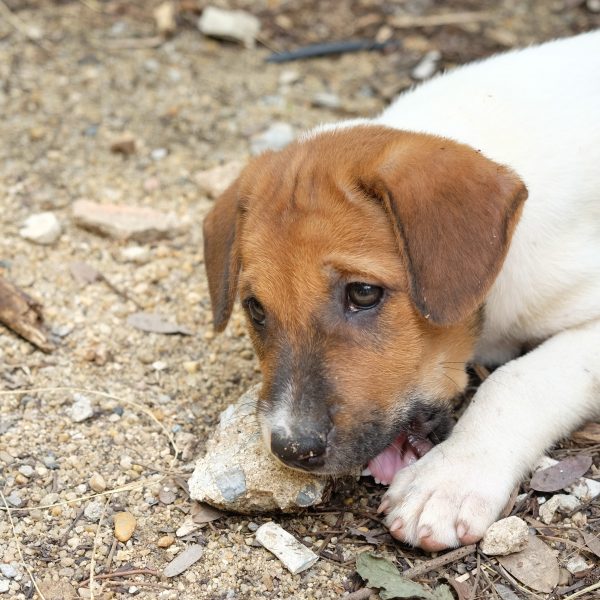Why Do Dogs Eat Rocks?

Dogs do a lot of weird things that don’t make sense to us, but may make perfect sense to them, like eating or chewing on rocks. This can cause issues. But, knowing the potential reasons behind their behavior can help you determine what’s going on and help them stop. Why do dogs eat rocks? Here are few reasons why your dogs might be eating or chewing on rocks:
1. Your Dog Could Have Pica
Pica in dogs is a medical condition and also a compulsive behavior where dogs will crave and eat non-edible items. This is a condition that also occurs in humans and other species. Dogs tend to eat weird things sometimes, especially as puppies, because they explore the world through their noses and mouth.
Because of this, eating strange or non-edible things every once in a while is probably normal or a reaction to something else. If it happens a lot and is more than a singular instance, there is a chance it could be pica. Rocks are one of the common items that dogs with pica will ingest. Because it is a compulsive behavior, they will also eat a lot of other things they shouldn’t.
Ingesting non-edible items is dangerous for your dog. It can block their intestines, perforate their stomach, and cause other serious health issues. With pica, the chance of ingesting something toxic or poisonous is higher. If you suspect your dog may have pica, it’s important to visit your vet.
2. They May Have an Undiagnosed Medical Issue
Aside from pica, your dog could be eating rocks, dirt, or other things due to a nutritional deficiency caused by a different undiagnosed medical issue. This behavior can sometimes be seen in dogs with undiagnosed and untreated diabetes, tumors, worms or other parasites, and more.
Generally, it is an attempt to get nutrients that they are currently missing in their diet or that their body is not properly absorbing from their food because of the underlying condition. This is why it is important to visit the vet when your dog is eating rocks. This is especially true if they are experiencing excessive thirst, loss of appetite, lethargy, frequent urination, weight loss, or other symptoms you should never ignore in your dog.
3. It Could be a Reaction to Teething
Puppies often explore the world with their mouths. They also experience teething, which can be painful. Often, they will chew on or eat things they shouldn’t in an attempt to relieve pain caused by puppy teething.
If your puppy is going through teething and you catch them chewing on or eating rocks, try to help relieve teething pain for them in a better way. An appropriate teething toy can help, especially one that you can freeze so it is cold.
If this is the reason your puppy is eating rocks, they should stop if you provide a better alternative to help them get through teething. If the behavior continues, it’s time to visit the vet. They’ll be able to help you either through better solutions for teething or through figuring out what else is going on.
4. Your Dog Could be Bored
A bored dog is often a mischievous and misbehaving dog as they will attempt to entertain themselves. Different signs your dog is bored include chasing their tail, chewing on their paws, licking a lot, chewing other things, getting into the trash, and more.
Boredom can also manifest as chewing or eating rocks. Making sure your dog has gotten enough exercise, mental stimulation, and attention can help keep them from doing things like this to relieve boredom.
5. They Could be Trying to Self-Soothe
Another reason a dog might be chewing on or eating rocks is that they are attempting to soothe themselves. A dog that is feeling stressed, anxious, annoyed, frustrated, and more will attempt to soothe themselves and relieve that tension.
Self-soothing behavior could be something like licking or chewing their paws, chewing in general, etc. It could also end up being something like eating rocks or chewing on them. If your dog suddenly starts doing this, take a step back and consider whether anything has happened that may have caused them to be nervous, anxious, stressed, etc.
If you can help them through it, they should stop eating rocks or chewing on them. If the behavior continues, it’s important to visit the vet. Even if the cause is stress or anxiety, your vet will be able to rule out other things and help you better help your dog.
6. Your Dog May Have Smelled Something Interesting
Rocks tend to pick up a lot of scents and they can also pick up food remnants, which makes them very interesting for your dog. They may mouth or chew on a rock that smells particularly interesting. And, if there’s food on it, they may eat it.
If this is not a usual behavior, the “drop it” or “leave it” command can be useful. If it becomes a more common behavior despite training and mastering those basic commands, you’ll want to visit the vet. Doing so will help you rule out other things and, if there isn’t another cause, you can get some tips on how to stop your dog from eating rocks.
These are a few potential reasons why a dog might be eating or chewing on rocks. Knowing a few answers to “Why do dogs eat rocks?” and knowing what’s normal for your dog can help you figure out what’s going on.
If signs point to something concerning or you’re just not sure, it’s always a good idea to consult your veterinarian. Plus, they can help you determine the best way to get your dog to stop eating rocks so that they don’t damage their teeth, choke, end up with a blockage, or end up with another issue.
